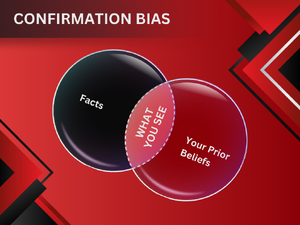Confirmation Bias

Confirmation bias refers to the tendency of people to search for, interpret, favor, and recall information in a way that confirms their preexisting beliefs or hypotheses. This bias can lead individuals to selectively gather evidence that supports their views while dismissing or ignoring contradictory evidence. It can affect decision-making, reasoning processes, and even the way people interpret new information, often leading to reinforcing existing beliefs rather than critically evaluating them.
Avoiding confirmation bias requires conscious effort and the application of critical thinking skills. Here are some strategies to mitigate confirmation bias:
- Seek diverse sources: Actively seek out information from a variety of sources with different perspectives and viewpoints.
- Consider alternative explanations: Challenge your own beliefs by considering alternative hypotheses and explanations for the same set of evidence.
- Evaluate evidence objectively: Assess evidence impartially without letting your preexisting beliefs influence your judgment.
- Encourage dissent: Encourage open discussion and seek opinions that differ from your own to gain a broader understanding of the issue.
- Be aware of emotional responses: Recognize and manage emotional responses that may cloud your judgment or lead to biased reasoning.
- Question assumptions: Challenge assumptions underlying your beliefs and be willing to revise them in light of new information.
- Use structured decision-making: Employ structured methods like decision matrices or decision trees to objectively evaluate options based on defined criteria rather than personal biases.
- Verify facts: Verify facts and information through reliable sources to ensure accuracy and avoid relying on information that confirms your biases.
By consciously applying these strategies, individuals can reduce the impact of confirmation bias and make more informed and objective decisions.
